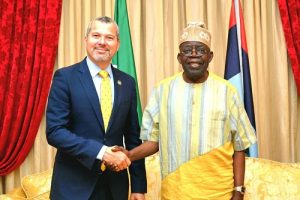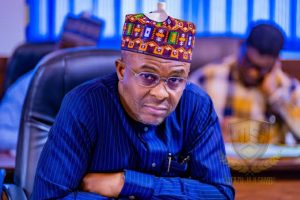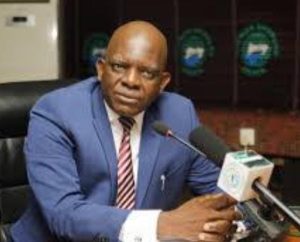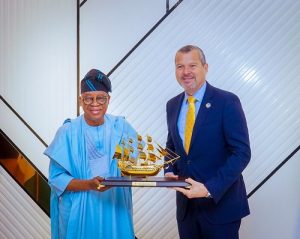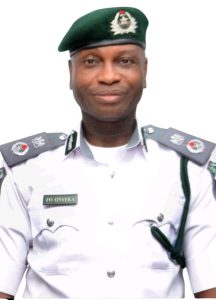NIMASA: Dakuku and the Ides of March

By Francis Ugwoke
In the next few days, the federal government shall speak on the affairs of the Nigerian Maritime Administration and Safety Agency (NIMASA). It will speak on the next level of the apex maritime agency. It is expected to speak on very vital issue of either reappointing the incumbent Director General, Dr. Dakuku Adolphus Peterside or naming his replacement.
For Dakuku, supporters and industry stakeholders, it has perhaps been anxiety in the past few weeks on what happens next.
Dakuku was appointed DG of NIMASA in March 10, 2016. In effect, the renewal of his appointment is due in just a few days. While many believe that he has done well and deserves a return ticket, Dakuku who started his political career at the age of 29 is probably not too sure of being returned. This, according to sources has to do with clash of interests among gladiators in the system. Just few days ago, reports had it that the Presidency has appointed one of his Directors, Dr. Bashir Jamoh, as a replacement. To many, this certainly will be a clash of interest between the power brokers in the Presidency and the Transport Minister, Hon. Rotimi Amaechi who naturally would want Dakuku to be reappointed. Amaechi is speculated not to be in the best of relationship with the power brokers who are said to be working on clipping his feathers for obvious reasons. From all indications, there appears to be a disagreement between Amaechi and the power brokers on the issue of who should be NIMASA DG. Reacting to reports about Jamoh’s reported appointment, the Transport Minister said he was not aware of this development. The Wheel, The Cable, both Online news reported that President Muhammadu Buhari had appointed Jamoh to replace Dakuku. But Amaechi who spoke to AIT News Thursday said as the Minister of Transport, he ought to know if Dakuku was removed or not by the President. Acknowledging that Dakuku’s tenure will soon expire, the Minister argued that even if it is not going to be renewed, the idea of bringing in another person to replace him should wait until expiration of his tenure.
He said, “I am not aware of that. The president has the right to remove him or replace him if he will not renew his appointment. But if his appointment is not going to be renewed it should wait until it expires.
He added, “ But if it is a sack as you said, If am still the Minister of Transport, I am the one who will inform him of his removal”. The revelation from Amaechi was a clear indication that there is a disconnection somewhere on Jamoh’s appointment. Observers simply opined that the power brokers may have decided to simply play their game keeping the Minister out of it. Amaechi’s response was therefore considered as simply to fight back and put it on record.
Sources said that though President Muhammadu Buhari would not reject Amaechi’s proposal to allow Dakuku to be retained, access to the President on this matter is not guaranteed since it will still have to be facilitated by the same power brokers. In NIMASA and among stakeholders, many believe that Dakuku may be reappointed because of the dimension that the matter has taken. Others have contrary view. Incidentally, those close to Dakuku said he will not follow the pattern of the former boss of Federal Inland Revenue Service (FIRS), Dr. Babatunde Fowler who was almost on his knees begging to be reappointed on expiration of his tenure but was still fired. Dakuku may not have such issues which were raised as the reasons for the failure to retain Fowler. So it would certainly be unfair not to reappoint him, some opined. Though a petition is being circulated with series of allegations against Dakuku and his management team, in what observers believe was to serve as a weapon against his reappointment. To observers, it would appear clear that the power brokers are indeed opposed to Amaechi even with his sacrifice in the election and re-election of Buhari in 2015 and 2019. Some are of the view that Dakuku should be prepared to respond to some of the allegations being bandied against him for the simple reason of not just surviving the Ides of March, referring to Williams Shakespeare’s play – Julius Ceasar, but also to clear his name. And this is imperative. Having been appointed in March, his reappointment is also expected in March legitimately. Talking about the Ides of March, a Roman seer had warned Julius Ceasar, the Roman dictator who wanted to transform into the position of Emperor of an impending danger, his assassination, most likely with the involvement of those close to him, which he doubted. The date came but nothing happened. Ceasar had therefore while heading to the Senate mocked the seer who also in return reminded him that though the date had come it had not passed. Surprisingly, Ceasar was later assassinated in an ambush and attack led by his close friend, Brutus who had with him 60 other conspirators in what has become a big lesson for leaders to exercise every caution in all circumstances. In the case of Dakuku, what could be similar here is simply the intrigue in getting political office and its sustenance. The clash of interest is clear in the two scenarios. Here it is the survival of the fittest. No doubt Dakuku has done well, all the same, in Nigerian politics, it is not about one’s achievements, it is about satisfying specific interests of the power brokers, whether good or bad. Dakuku, a former House of Reps member, Commissioner for Works, Senior Special Assistant to Governor of Rivers State on works, local government chairman, is seen as a brilliant and smart politician. On assuming office in NIMASA in 2016, he had few months later introduced a 5-point agenda on how to reform the sector. This was based on what appeared like loss of direction on the part of NIMASA on its core statutory function as an apex maritime agency. With few months of studying the sector, he introduced the five point agenda on “strengthening of maritime safety and security; maintenance of a clean maritime environment; enhanced port state control; building human and infrastructural capacity and sanitising the maritime environment”. Dakuku was apparently compelled to come out fast with the agenda when confronted with myriad of problems that made the apex maritime agency appear directionless. He is one man who believes in engaging stakeholders to key-into what he believes will lift the industry up.
He is seen as having done his best in the past four years as far as the agenda he set is concerned. Last year, he introduced a five-year strategic plan to bring to an end in stages the grant of Cabotage waiver beginning from 2021. Before this, there were criticisms about the domination of foreign vessels operating illegally in the nation’s territorial waters in what led to a comatose situation among many indigenous shipping companies. Early this year, the agency disclosed that it had recorded last year 200 vessels as captured in the cabotage register as against 94 in 2017. The agency said 20 new vessels are now flying Nigerian flag. Perhaps what has remained unresolved is the disbursement of the Cabotage Vessel Financing Fund (CVFF), which is hindered by the position of the Ministry of Transport Minister on the issue. After saying he had received approval for the disbursement, Amaechi does not seem to agree with stakeholders on how to disburse the fund. In maritime labour, signing of the tripartite agreement by stakeholders is seen as an achievement under Dakuku. This to a large extent has helped in industrial peace and harmony in the Industry. Last year, employment in maritime labour increased as no fewer than 3,179 were employed. This has been described as an impressive record, made possible with the suspension of manning waiver with shipping companies.
To reform the ship registry, the agency set up 9-man committee to ensure that Nigeria has a registry that can meet international certification standards and compete favourably in the global maritime community. With planned automation, it is expected that this will enhance Nigeria ship registry’s global best practices.
Perhaps, the only area that appears to be a big issue for the agency under Dakuku is in maritime safety and security. Although the agency has done well in Port and Flag State Control with Nigeria adjudged most outstanding in West and Central Africa Sub-Region by the Abuja Memorandum of Understanding (MoU), the menace of pirates is rubbishing a lot of efforts. Pirates and armed bandits strike again and again within Nigerian territorial waters and in the Gulf of Guinea in what has been a bad signal to the international shipping community. With huge resources, NIMASA is collaborating with the Nigerian Navy and other relevant security agencies to address the problem. The Gulf of Guinea crisis is being battled by both West and Central African countries with Nigeria playing a leading role. African leaders had met to introduce a strategy to ensure a safe and secure maritime domain by tackling all forms of maritime crimes in the West and Central Africa sub-region. Part of the efforts to check all forms of piracy and maritime crime is found in the idea of the deep blue project championed by the apex maritime agency.
However, back to who takes the mantle of leadership in NIMASA, staff of the agency, stakeholders and journalists have remained anxious on what happens next. What is currently on the table is the possibility of reappointing Dakuku or simply confirming the speculations of Jamoh’s appointment. This is expected to be settled latest by March 10 when Dakuku’s tenure expires or before the end of next week. It is also being speculated in some quarters that the Presidency may be shopping for a replacement from outside. This is considered by observers as the worst scenario for obvious reasons. The maritime industry is fast on motion and needs someone who will flow along with experts and technocrats in the global shipping arena.

